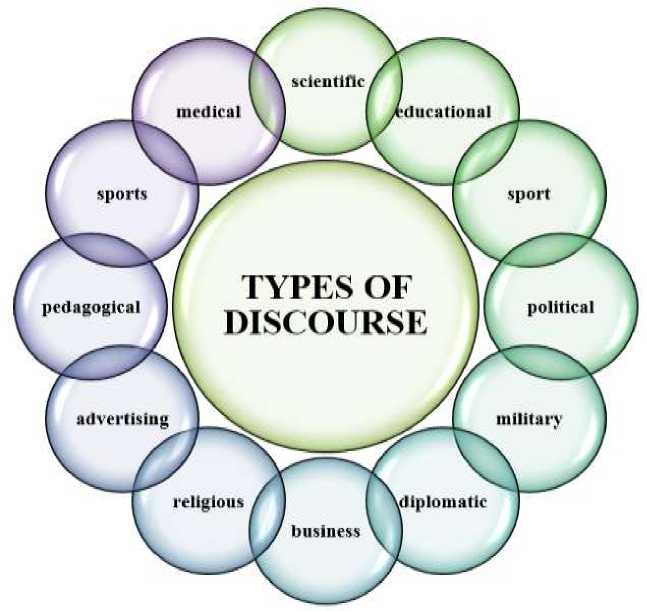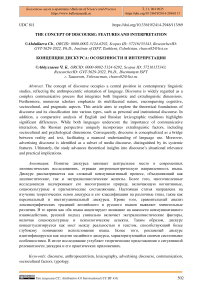The concept of discourse: features and interpretation
Автор: Abdullaeva Ch.
Журнал: Бюллетень науки и практики @bulletennauki
Рубрика: Социальные и гуманитарные науки
Статья в выпуске: 4 т.11, 2025 года.
Бесплатный доступ
The concept of discourse occupies a central position in contemporary linguistic studies, reflecting the anthropocentric orientation of language. Discourse is widely regarded as a complex communicative process that integrates both linguistic and extralinguistic dimensions. Furthermore, numerous scholars emphasize its multifaceted nature, encompassing cognitive, sociocultural, and pragmatic aspects. This article aims to explore the theoretical foundations of discourse and its classification into various types, such as personal and institutional discourse. In addition, a comparative analysis of English and Russian lexicographic traditions highlights significant differences. While both languages underscore the importance of communicative interaction, the Russian perspective uniquely incorporates extralinguistic factors, including sociocultural and psychological dimensions. Consequently, discourse is conceptualized as a bridge between reality and text, facilitating a nuanced understanding of language use. Moreover, advertising discourse is identified as a subset of media discourse, distinguished by its systemic features. Ultimately, the study advances theoretical insights into discourse’s situational relevance and practical implications.
Discourse, anthropocentrism, lexicography, advertising discourse, communication, sociocultural factors, typology
Короткий адрес: https://sciup.org/14132629
IDR: 14132629 | УДК: 811 | DOI: 10.33619/2414-2948/113/69
Текст научной статьи The concept of discourse: features and interpretation
Бюллетень науки и практики / Bulletin of Science and Practice
UDC 811
The concept of discourse has become a central focus in contemporary linguistics, which increasingly emphasizes the anthropocentric nature of language. Numerous definitions of discourse exist, each highlighting specific facets of this multifaceted phenomenon. To substantiate our perspective on discourse, it is useful to consider several key descriptions.
Discourse is fundamentally understood as a communicative process (sender – text – recipient) that enables the study of humans through the medium of language. According to N. D. Arutyunova, the presence of human agency is evident across the entire linguistic spectrum, including word semantics, sentence structures, and the organization of discourse itself. A. Prikhodko conceptualizes discourse as a linguistic and cultural phenomenon that can be analyzed along three dimensions: linguistic (form), sociocultural (content), and communicative-pragmatic (function). This tripartite parameterization presents discourse as a complex cognitive-communicative entity characterized by both procedural and resultant aspects [5].
K. Wales asserts that the concept of discourse extends beyond messages and texts to include the recipient, sender, and situational context. This perspective aligns with the views of J. Leech and M. Short, who consider discourse to encompass both oral conversations and written communication between writers and readers, giving rise to the notion of “literary discourse.” J.P. Gee defines discourse as the outcome of the linguistic integration of actions (interactions), modes of thinking, and evaluative mechanisms essential for specific social groups. Similarly, V. V. Krasnykh conceptualizes discourse as speech shaped by linguistic and extralinguistic factors, viewing it as a synthesis of process and outcome [6].
In line with V. I. Karasik’s definition, discourse represents a linguistic process marked by deviations from normative written speech, embodying a dynamic and immediate form of language characterized by thematic coherence and communicative clarity. N. D. Arutyunova provides a widely accepted definition of discourse as: “Discourse (French discours, ‘speech’) is a perspective of reality shaped by extralinguistic factors within a given text; it is speech viewed through the lens of interactions among individuals and their cognitive mechanisms, functioning as a targeted social action.” T. A. van Dijk complements this interpretation by emphasizing the societal context, which facilitates understanding among participants and elucidates the processes of generating and perceiving speech. Uzbek linguist A. Pardaev defines discourse as the practical application of linguistic and non-linguistic resources in forms deemed most effective for exchanging ideas and influencing one another. In Uzbek linguistics, Sh. Safarov posits that texts and messages, as outcomes of human speech, cannot be categorized solely by their oral or written forms; instead, they should be understood as inherently interconnected phenomena. A. Duranti characterizes discourse as the study of any aspect of language use, while N. Fairclough views discourse as more than language usage — positioning it as language use analyzed as a form of social practice.
Despite the diversity of definitions, each emphasizes the most salient attributes of discourse. Summarizing these attributes, discourse may be defined as embodying anthropocentrism, sociocultural determinism, situational relevance, intentionality, dynamism, procedurality, and addressivity. Consequently, based on the perspectives of the aforementioned scholars, discourse can be understood as a process of mutual communication among speakers and as a linguistic phenomenon existing within the interplay of intralinguistic and extralinguistic factors.
Another significant issue in discourse theory concerns the classification of its various types. A review of linguistic literature reveals considerable diversity in the typology of discourse. Below are some of the most prominent classifications. V. I. Karasik identifies two primary types of discourse:
personal (personality-oriented) and institutional (political, judicial, military, pedagogical, media, religious, medical, business, advertising, scientific, and others) [12].
T. Lakoff introduces a unique category—persuasive discourse —contrasting it with ordinary conversation. The primary function of persuasive discourse, according to R.T. Lakoff, is persuasion, characterized as the deliberate volitional expression of the sender. V.V. Krasnykh identifies argotic discourse, which includes categories such as everyday, colloquial, vernacular discourse, and specialized criminal jargon [12].
Sh. S. Safarov, treating discourse as speech activity, incorporates components such as referential situations and the speaker's attitudes, reflecting the pragmatic essence of this phenomenon [10].
From this perspective, the study of discourse as a thematic and content-based collection of texts operating within a unified communicative framework enables the identification of its typologies, represented schematically as follows:

scientific medical durational sport, sport pedagogical political advertising inilitarv religious
^diplomatic business
TYPES OF DISCOURSE
Summarizing all above mentioned, the typology of discourse represents a broad and contested domain of inquiry. A review of linguistic literature reveals diverse approaches, perspectives, criteria, and classifications. Given the systemic nature of discourse, it may be hypothesized that advertising discourse constitutes a subset of media discourse, characterized by distinctive systemic features within mass communication that differentiate it from other discourse types [13].
This article aims to examine the lexicographic positioning of the term discourse and the core concepts of advertising discourse (AD) in the languages under comparison. To this end, the analysis focuses on the term discourse as presented in lexicographic sources, including encyclopedic, etymological, and terminological dictionaries, glossaries, and linguistic resources in English and Russian. The analysis begins with the Online Etymology Dictionary, which offers a comprehensive interpretation of the term [8].
Discourse (n.) — “process of understanding, reasoning, thought,” originating from Old French discours and Latin discursus (“a running about”), later evolving in Late Latin to mean “conversation” and in Medieval Latin to signify “reasoning.”
By the 1550s, it denoted “a running over a subject in speech, communication of thought in words,” and by the 1580s, it referred to “discussion or treatment of a subject in formal speech or writing.”
Further definitions from leading dictionaries, including the Cambridge Dictionary, American Dictionary, Wikipedia, and others, uniformly emphasize the role of communication in speech and writing, discussion, and the conveyance of thought [1, 9].
A comparative lexicographic analysis of English and Russian sources reveals that, while both languages share common meanings of discourse — such as communication, speech, and discussion—the Russian lexicographic tradition uniquely emphasizes the integration of extralinguistic factors, including pragmatics, sociocultural, and psychological dimensions [14].
Lexicographic analysis highlights that discourse bridges reality and text through communicative interaction. It encapsulates both linguistic and extralinguistic dimensions, offering a nuanced framework for understanding language use in diverse contexts. This conceptualization reinforces discourse as a phenomenon that integrates communicative, cognitive, and sociocultural aspects within a unified theoretical framework.


